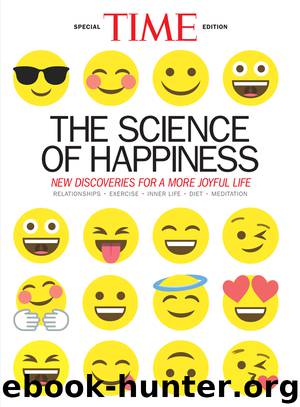TIME the Science of Happiness by The Editors of TIME

Author:The Editors of TIME
Language: eng
Format: epub
Tags: SEL016000;PSY013000;MED102000
Publisher: Liberty Street
Published: 2016-06-24T04:00:00+00:00
What makes you happy? It’s a fun question because many people don’t understand the surprisingly small role that having a lot of money plays. In fact, research consistently shows that, yes, money can play a role in your well-being and your level of joy, but not for the reasons you might think. For instance, a fat paycheck doesn’t mean a happier life. And spending on big-ticket items such as cars or fancy televisions doesn’t deliver either. Here, the new rules for a healthier approach to wealth.
1. SHOPPING ISN’T THE BEST APPROACH
Acquiring material things can still leave a person feeling empty. Shopping for something you don’t need brings only a short-lived high, research shows.
2. BEING FRUGAL CAN BE JOYFUL
The science of happiness has enjoyed a resurgence since the Great Recession, when people began to turn away from the vacations and homes they couldn’t afford and focused instead on relationships and experiences. This was partly out of need. Still, many discovered higher levels of happiness in tough times—after scaling back their lifestyle and not worrying so much about how they measured up against their neighbors.
3. MORE ISN’T ALWAYS BETTER
Global happiness readings routinely show that the richest countries are not the happiest and, in fact, some poor ones land near the top. So countries such as Costa Rica and Vietnam outscore Japan and the U.S. These surveys are imperfect; others closely link peace and general prosperity with happiness, giving nations such as Denmark and Norway a top rank. But the U.S., Germany and other rich nations still fall far down the list.
4. SPLURGE FOR EXPERIENCES, NOT THINGS
According to Happify, a well-being website, 57% of Americans say experiences make them happiest, especially those that bring them together with family and friends, provide a memorable story, are linked to their personal values and are unusual. Spending on a TV or home does not make us happier, while spending on leisure does wonders for our disposition by reducing loneliness and boosting optimism.
5. SPEND IT ON SOMEONE ELSE
There is one way more money makes us happier: spending it on others. Giving provides innate pleasure, as shown in one study in which 2-year-olds were happier giving away Goldfish crackers from their own stash than from someone else’s pile.
6. YOUR SALARY CAN’T SAVE YOU
Money plays a role in happiness, for sure. But after a person has enough income to meet basic needs, additional income seems to have little impact. In the U.S., the magic income is $75,000 a year, according to research conducted over the past decade. Happiness generally rises with income to that level, research shows. But beyond this threshold, there is little effect on day-to-day happiness, though overall life satisfaction continues to rise with income.
Download
This site does not store any files on its server. We only index and link to content provided by other sites. Please contact the content providers to delete copyright contents if any and email us, we'll remove relevant links or contents immediately.
Should I Stay or Should I Go? by Ramani Durvasula(7652)
Why We Sleep: Unlocking the Power of Sleep and Dreams by Matthew Walker(6697)
Fear by Osho(4727)
Flow by Mihaly Csikszentmihalyi(4685)
Rising Strong by Brene Brown(4448)
Why We Sleep by Matthew Walker(4433)
The Hacking of the American Mind by Robert H. Lustig(4375)
How to Change Your Mind by Michael Pollan(4355)
Too Much and Not the Mood by Durga Chew-Bose(4337)
Lost Connections by Johann Hari(4171)
He's Just Not That Into You by Greg Behrendt & Liz Tuccillo(3889)
Evolve Your Brain by Joe Dispenza(3668)
The Courage to Be Disliked by Ichiro Kishimi & Fumitake Koga(3486)
Crazy Is My Superpower by A.J. Mendez Brooks(3397)
In Cold Blood by Truman Capote(3374)
Resisting Happiness by Matthew Kelly(3337)
What If This Were Enough? by Heather Havrilesky(3308)
The Book of Human Emotions by Tiffany Watt Smith(3300)
Descartes' Error by Antonio Damasio(3270)
